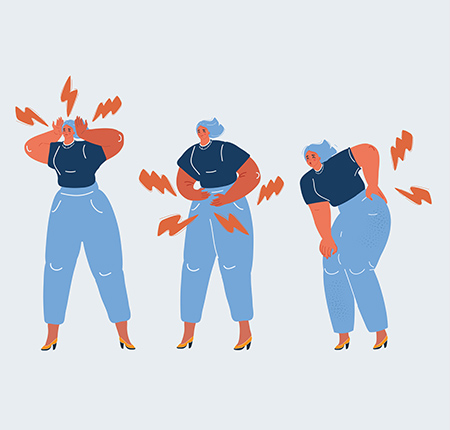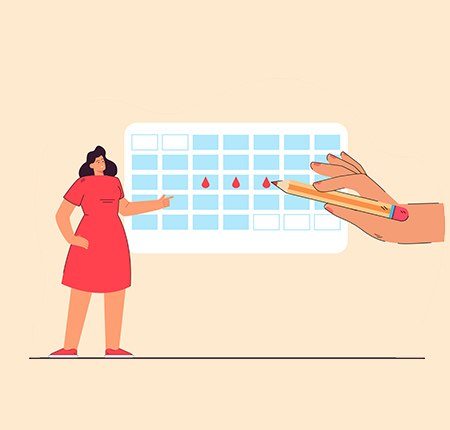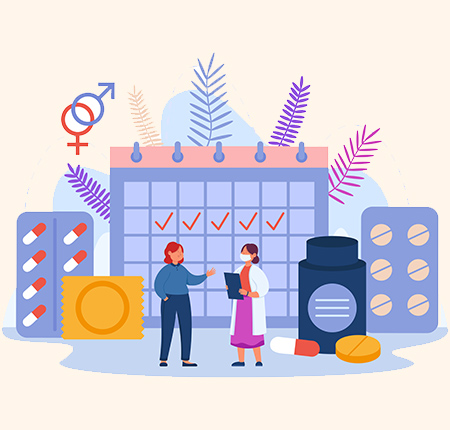
Pregnancy symptoms: What are the first signs that you are pregnant
It is known that missing periods can be one of the first signs of pregnancy. But is it that simple? The first symptoms differ from one person to another, because every woman is different. Moreover, sometimes symptoms may be absent or not noticed. If you want to know what are the most common signs of pregnancy, read the article!
Pregnancy symptoms - How do you know you are pregnant
Could you be pregnant? Before the pregnancy test and even before missing your period, here's what you might feel. When you know the early signs, you know what to expect.

How do you feel when the pregnancy is fixed?
It is not a clear sensation that you feel at the exact moment when the embryo attaches itself to the uterine walls. But it is common for women to notice mild abdominal cramping or a tingling sensation in the abdominal area when implantation occurs. Also, implantation bleeding can indicate fixation of the pregnancy.
The first symptoms of pregnancy before the delay of menstruation
Light bleeding, pinkish discharge and spotting can be among the first signs of pregnancy and can appear even before you notice that your period is late. Other early signs may include fatigue, increased basal body temperature, morning sickness, increased tenderness, and breast changes. They can start even from the first week, 5-6 days after intercourse.
Is there a specific secretion that announces pregnancy? What does it look like?
If the discharge becomes more abundant, thin, milky white or transparent, it could be an early sign of pregnancy. The vaginal walls begin to thicken almost immediately after conception, and that's why these whitish discharges can occur. They may continue to be present throughout the pregnancy.
After how many days of late period do you know you are pregnant?
In general, it is considered late if your period does not start after 7 days from the date you were supposed to have it. It is not an automatic confirmation of pregnancy, because delays can have many causes that I discussed in another article where I told you everything about delayed menstruation . But it's time to take a pregnancy test. If you are indeed pregnant, the amount of hCG in your urine will now be enough to be detected.
If you want to get pregnant and want an earlier confirmation, there are ultra-sensitive tests that can detect pregnancy even before your period is late. They are also suitable if you have an irregular cycle and you don't know exactly when you were in your fertile period , when you were supposed to come or how late your period was.
Missing / Delaying the menstrual cycle
The most common sign that you are pregnant is the absence of your period. Why is this happening? Because the egg released during your cycle has been fertilized, so it won't be removed through bleeding. At this stage, most of the time, the next step is to take a pregnancy test. But it is important to remember that not every absence or delay of menstruation is a symptom of pregnancy - because menstruation can be delayed for various reasons!

For example, your period may be missing – the medical term is amenorrhea – because of:
a gynecological condition
A period of stress
Intense physical exercises
A health problem
Hormonal contraceptives
Constipation, abdominal cramps & bloating in pregnancy
Another sign of pregnancy can be bloating, in addition to digestive problems such as constipation and abdominal cramps. When you become pregnant, progesterone levels increase and can cause digestion to slow down, leading to constipation. Bloating occurs at the beginning of pregnancy also due to hormonal changes and with it, discomfort and cramps.
Abdominal cramps and bloating, however, also occur during menstruation or in case of gluten intolerance, so it is recommended to take a pregnancy test if you are not sure !
Frequent urination
Two or three weeks after conception, the need to urinate more often appears. You will feel like you have to go to the toilet a lot more than usual, especially at night. Why is this happening? Because the growing uterus puts pressure on the bladder.
But frequent urination can also occur for other reasons, for example urinary infection , but which is also accompanied by other symptoms that you can see here .
Nausea, vomiting and fatigue during pregnancy
When progesterone increases, in addition to slowing down digestion, fatigue can also appear, which is one of the most common symptoms in pregnancy. At the same time, blood glucose levels drop and blood pressure can drop – so it's normal to feel low on energy and tired.
Then the famous "nausea" of early pregnancy can appear, either with or without vomiting, but not for everyone. Moreover, nausea can occur at any time of the day, not just in the morning, and most commonly occurs 3 weeks after conception. During pregnancy, nausea occurs as a result of the rapid increase in estrogen and progesterone and some people may have a more heightened sense of smell than usual, being much more sensitive to various smells.
Apart from pregnancy, the most common causes of nausea are:
intense pain
Intense emotional stress
Motion sickness
indigestion
Food poisoning
Viruses
Exposure to chemical toxins
Biliary disorders
Sensitive, swollen and painful breasts
At the beginning of pregnancy, you may still feel that your breasts are more sensitive than usual. They can increase in volume even two weeks after conception due to hormonal changes. But at the same time, PMS symptoms include breast tenderness.
Increased sensitivity to taste and smell
More than 75% of pregnant women notice that their sensitivity to certain smells and tastes increases, according to research.
Hyperosmia, or sensitivity to smell, is one of the most common early symptoms of pregnancy, and it can start even just a few days after conception. The sensitivity to smell is usually more intense in the first trimester of pregnancy. We talked more about each stage of pregnancy and how it evolves by trimester HERE .
Increased heart rate
Another frequent first sign of pregnancy and which is strongest in the 1st trimester is the increased heart rate. The heart rate can increase by up to 30-40% of the normal pre-pregnancy rate, which is why palpitations are very common.
The heart pumps more blood and is more stressed, which is why palpitations are a sign that you can tell you are pregnant.
Increase in body temperature
If you are pregnant, your basal body temperature may increase. During pregnancy, body temperature rises by about 0.5℃ and stays at this level. So, if you track your body temperature and notice that it stays consistently higher for at least 18 days, it may be a sign that you are pregnant.
Vaginal bleeding
We're not just talking about implantation bleeding here, but light vaginal bleeding and spotting. They can occur in the first 1-2 weeks after fertilization and are quite common, in about 15-25% of pregnancies.
As more blood vessels develop in the cervical area, the sensitivity of the cervix may increase and it may bleed more. I talked more about vaginal bleeding in pregnancy in another article on the Enroush blog, which you can read HERE .
Changes of disposition
Estrogen and progesterone play a very important role in your mental health and emotional balance. And these two hormones fluctuate a lot in the early stages of a pregnancy. That's why the unexpected mood swings and mood swings you experience can be caused by the sudden changes in pregnancy hormones.
Nasal congestion
A stuffy nose, or rhinitis of pregnancy, can be another sign that you are pregnant. This congestion can start as early as the first few days of pregnancy and last up to 6 weeks without an infection or allergy causing it.
In general, women who suffer from asthma are more prone to a more severe form of this symptom, especially in the last trimester.
Dizziness
Headaches and dizziness are among the most common pregnancy symptoms that you can notice quite early on. Hormonal fluctuations and changes in the body are also responsible for these conditions, and the increase in blood volume is another important factor.
Most of the time, these dizziness disappear without treatment during the second trimester, when vitality, high energy levels and libido return. If you want to read more about sex during pregnancy, we have an article HERE where we told you everything you should know. I have also prepared another article for you on resuming your sex life after childbirth , if you gave birth by caesarean section.
Migraines and dizziness can return, however, in the later stages of pregnancy, when the uterus grows and puts pressure on certain blood vessels.
Diarrhea
Stool changes are normal during pregnancy. Hormonal fluctuations can sometimes put a strain on the digestive system, slowing down the entire process, which can cause diarrhea and other digestive problems.
Because hormonal changes begin early in pregnancy, watery and frequent stools can be a sign that you are pregnant. Hydration and a balanced diet can help you manage this symptom more easily.
Heartburn
In addition to the hormonal changes that occur in the body and affect the digestive process, the fact that a baby is growing in your womb that puts pressure on the stomach can contribute to excess gas and heartburn. In the first trimester, these burning sensations can be a fairly common symptom.

Pregnancy without symptoms
While you may have signs that you are pregnant, many women go through pregnancy without the usual symptoms. Some people may even lack them! For example, if you have polycystic ovaries, you may have no or very few pregnancy symptoms. Nausea can be imperceptible, but if you have this condition it is good to consult a doctor because complications can also occur.
Ectopic pregnancy: symptoms
Although it may not be noticeable at first, because there may not be symptoms of an ectopic pregnancy, an ectopic pregnancy has the usual signs. But this is a complication that cannot continue as a normal pregnancy. Signs will intensify over time, and the earliest may include:
Pelvic and lumbar pain
Abnormal vaginal bleeding
Cramps in one side of the pelvis
It is important to go to the doctor if you have severe pain, suddenly, in the abdomen or pelvis, if you have shoulder pain or a state of dizziness or fainting - these can be symptoms of a ruptured fallopian tube that can cause internal bleeding - fatal if not treated.
Conditions with symptoms similar to pregnancy
- Stress, premenopause and weight fluctuations: are common causes of a missed period
- Unbalanced diet and alcohol consumption: can cause nausea, dizziness and headaches
- Common colds, allergies or infections: can cause nasal congestion, dizziness and fatigue
- Birth control pills and other medications: Hormonal changes caused by birth control pills and other medications can lead to mood and menstrual cycle changes
- Gastrointestinal disorders: May cause digestion problems, sensitivity to smells, nausea and indigestion
- Thyroid problems and other conditions: Hormonal imbalances, which we talked about more HERE , can have many pregnancy-like symptoms, including late periods.
Frequently asked questions
Many of these signs and symptoms are not specific to pregnancy. Some may indicate that you are about to have your period or have an intolerance to certain foods.
However, if your period is missing and you already notice the above signs, take a pregnancy test at home or consult your gynecologist.
Do secretions look different if I'm pregnant?
Vaginal secretions can change during pregnancy: they can be more watery and sticky, thus protecting the fertilized egg. During the first 2-3 weeks, the increased level of estrogen can cause an abundant white secretion, and this can be the secretion that announces the pregnancy.
Can I be pregnant even if the test is negative?
When you take a pregnancy test and the result is negative, it can happen that it is a false one and you are pregnant. The negative result of a pregnancy test will be indicated by the pink line only in zone C. But there is a probability of getting a false negative result, which is more common than the false positive result. If you are not sure that the test result is correct, it is best to go to a clinic.
Can I have my period even if I am pregnant?
Yes, it can happen that your period comes before pregnancy. If you bleed, we recommend using organic, chemical-free and plastic-free menstrual products to take care of your hormonal balance.
What do you feel when the pregnancy is fixed?
Early pregnancy symptoms include pain and changes in breast texture, more frequent urination, increased fatigue, nausea, chills, abdominal cramps, constipation and bloating, spotting (light bleeding) and food sensitivities.
How long do you stay pregnant after sexual contact?
Conception can occur within 3 minutes after sex and up to 5 days. Implantation occurs within 10 days after fertilization. What you need to know is that you are not pregnant until implantation has occurred.
How and when is a pregnancy test done?
You can take a pregnancy test starting from the first day your period was late, and if you are not sure when you should have your period, it is recommended to do it at least 21 days after unprotected sexual contact. It is good to know that some tests can be used even before menstruation, and above all, each person can have different symptoms.
Read all about pregnancy tests in our article !
How many weeks is a pregnancy?
A pregnancy is 40-41 weeks and is divided into trimesters.
What are the symptoms when you lose a pregnancy?
About 15-20% of pregnant women experience a miscarriage in the first three months of pregnancy. Among the signs can be: vaginal bleeding, abdominal cramps, loss of amniotic fluid. If you suspect a miscarriage, see a doctor.
How do I get rid of an unwanted pregnancy?
In case of an unwanted pregnancy, consult your gynecologist and choose the best option for you. There is medical abortion (up to 7 months). And the morning after pill cannot cause an abortion.
If you are already pregnant, emergency contraception has 0 effects on your body. The hormone in these pills works by delaying or preventing ovulation, just like the regular birth control pill: it's just a higher dose! The pill can ONLY PREVENT a pregnancy, under no circumstances terminate it.
Although it is a common myth that it can terminate a pregnancy! Discover other popular myths related to contraceptives, here !






















